The Trans Histories Lab supports non-extractive research on trans history and cultural production in Baltimore and Washington D.C. Coordinated by the Tabb Center and composed of grassroots organizers, artists, students, faculty, and curators, the lab facilitates cross-pollination between undergraduate courses, public lectures, workshops, special collections acquisitions, and community-based research. We are committed to collaborative knowledge production and transformative justice within and beyond the academy.
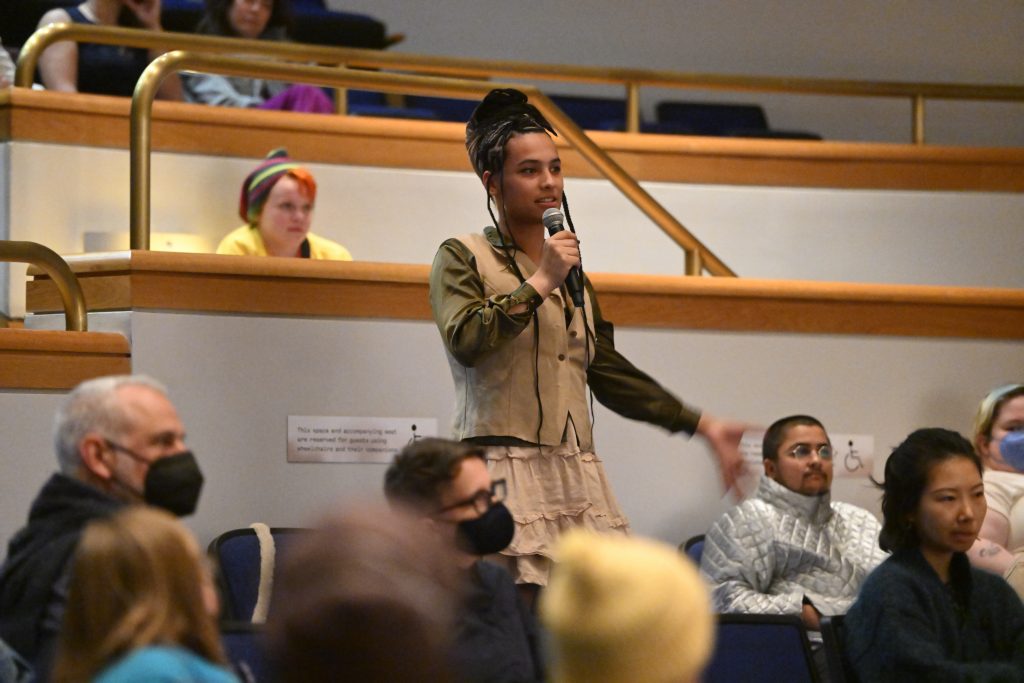
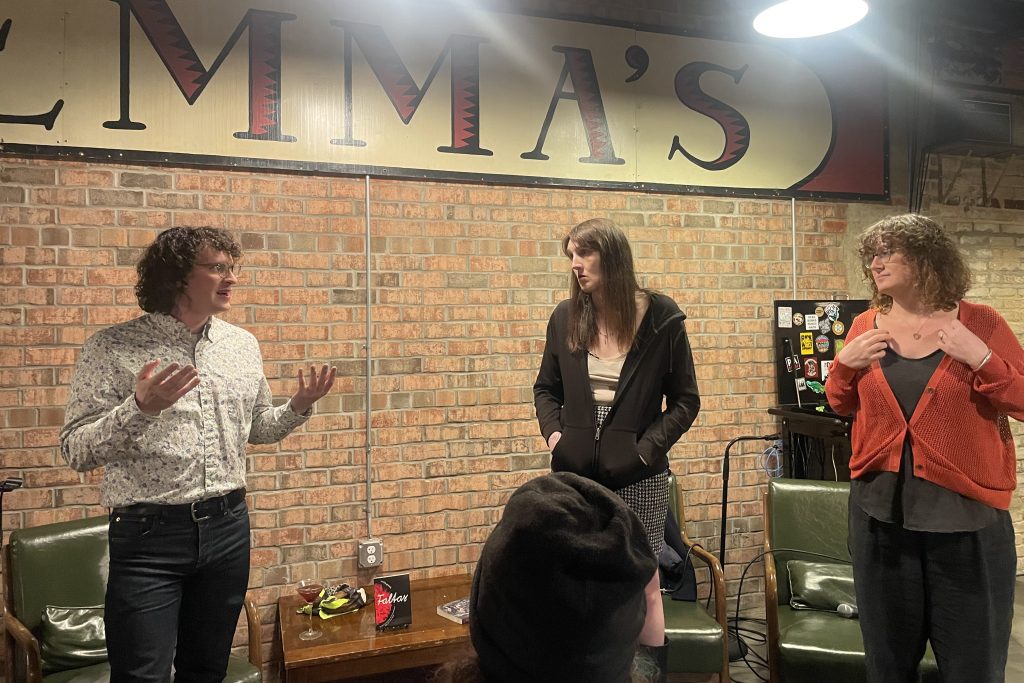
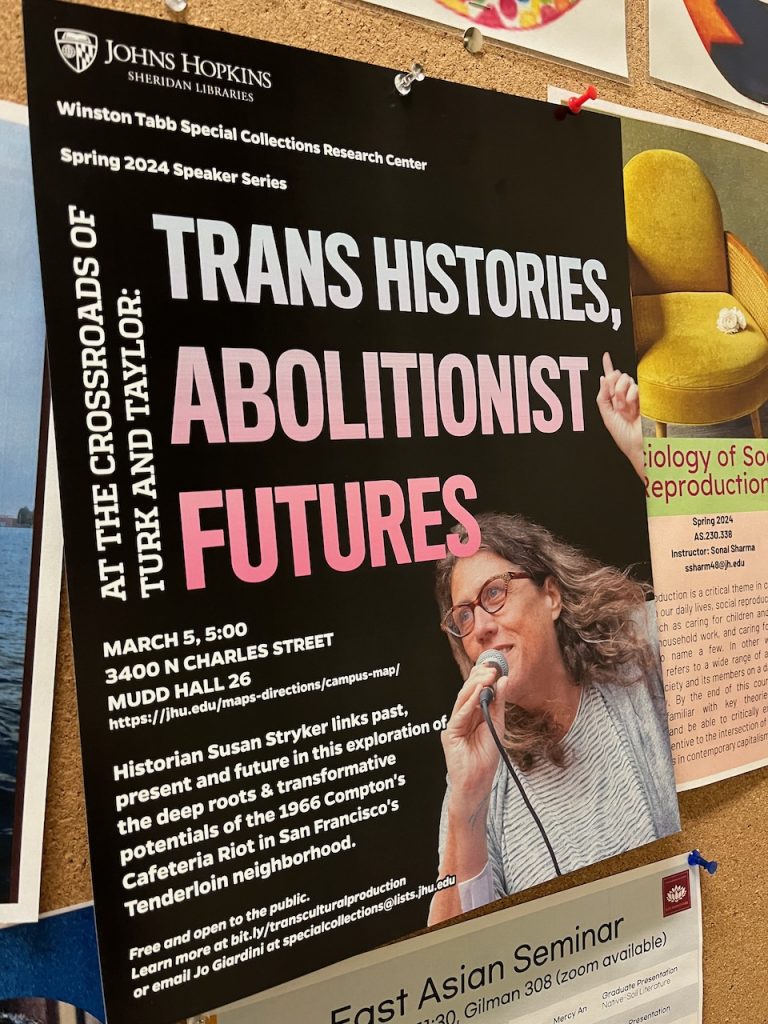
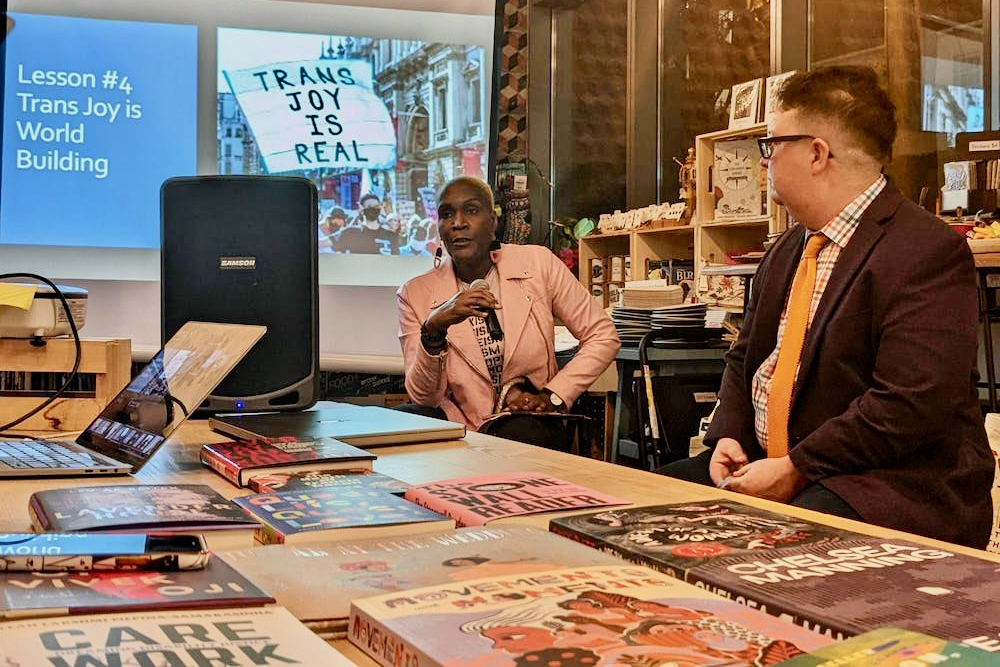
Lab Components
Workshops, Events, and Speakers
Events have included a workshop with the Tretter Transgender Oral History Project, a screening of “Framing Agnes” followed by a discussion with historian Jules Gill-Peterson, and a speaker series focused on trans cultural production.
Undergraduate Courses
Affiliated Hopkins courses have included Queer Oral History (Spring 2022), A Century of Trans Cultural Production (Spring 2024), and Public Humanities & Social Justice (Fall 2023).
Oral Histories and Archival Acquisitions
The community-based “Vintage T” project and Hopkins undergraduates have recorded and archived over 25 oral histories. Special Collections librarians have acquired the full archive of the independent, artist-run press GenderFail.
History and Partners
The Trans Histories Lab grows out of the course Queer Oral History taught by Tabb Center director Joseph Plaster in Spring 2022. Students identified local trans history as a vital area of study and Baltimore-based guest lecturers Jamie Grace Alexander and Rahne Alexander became key collaborators. In the summer of 2022, Sophia Lola (JHU 2022) continued her coursework by researching the impact of the 2015 Baltimore Uprising on trans organizing. In December 2022, the Lab invited Andrea Jenkins and Myrl Beam to hold an oral history training and give a talk about their work with the Tretter Transgender Oral History Project, focusing on the ways storytelling can foster trans justice.
In 2023, Tabb Center Society of Fellows postdoctoral fellow Jo Giardini began pursuing research on the closure of Johns Hopkins’ Gender Identity Clinic in the late 1970s. The Tabb Center also featured a screening of Framing Agnes at the Baltimore Museum of Art and a talk by Jeanne Vaccaro on trans visual culture and trans oral history.
Also in 2023, three Baltimore-based trans organizers — Jamie Grace Alexander, Rahne Alexander, and “Sistas of the T” director Monica Yorkman — began collaborating with Plaster and Giardini to launch “Vintage T,” a community-based oral history project that documents the perspectives, strategies, and personal histories of trans elders in Baltimore. The three organizers identified research questions; developed an interview guide; conducted oral histories; and developed strategies for sharing the results with other members of the community. They have also participated in oral history workshops, co-taught Johns Hopkins courses, and archived a dozen oral history recordings.
In 2024, Giardini taught A Century of Trans Cultural Production (Spring 2024) and organized a speaker series highlighting cultural production by trans, non-binary, and gender-nonconforming artists, writers, historians, poets, and musician. Librarian Siân Evans began making acquisitions related to trans cultural production for the Sheridan Libraries, including the full archive of the independent, artist-run press GenderFail. In short, the Lab has supported an exchange of knowledge that spans the Hopkins classroom, the greater Baltimore region, and the broader trans studies landscape.
Workshops, Events, and Speakers
The Trans History Lab has sponsored talks and workshops at Impact Hub Baltimore, Red Emma’s bookstore, Bird in Hand bookstore, Johns Hopkins University, and the Baltimore Museum of Art. Our events bring together publics within and beyond the academy to reflect on the past and imagine more expansive trans futures.
In Spring 2024, Jo Giardini organized a speaker series highlighting cultural production by trans, non-binary, and gender-nonconforming artists, writers, historians, poets, and musicians. Speakers included Susan Stryker, Cat Fitzpatrick, Casey Plett, Chris E. Vargas, Andrea Abi-Karam, and Kay Gabriel. The event “Exploring Trans Archives,” organized by Jo Giardini, Joseph Plaster, and Siân Evans, featured hand-selected objects from Special Collections, including trans oral histories, artist books, and zines. More information can be found on the Tabb Center speaker series page.
The Tabb Center’s Spring 2023 Curating Archives series included a screening of “Framing Agnes” at the Baltimore Museum of Art, followed by discussion with Johns Hopkins historian Jules Gill-Peterson and filmmaker Chase Joynt. The Lab also hosted a talk by Jeanne Vaccaro on trans visual culture and oral history; Vaccaro met with Vintage T organizers over dinner to co-create an oral history interview guide.
In December 2022, Andrea Jenkins and Myrl Beam held an oral history training at Impact Hub Baltimore. Jenkins and Beam also gave a talk at Bird in Hand about their work with the Tretter Transgender Oral History Project (TTOHP) and the ways storytelling can foster trans justice. Read about their talk in the JHU Newsletter.
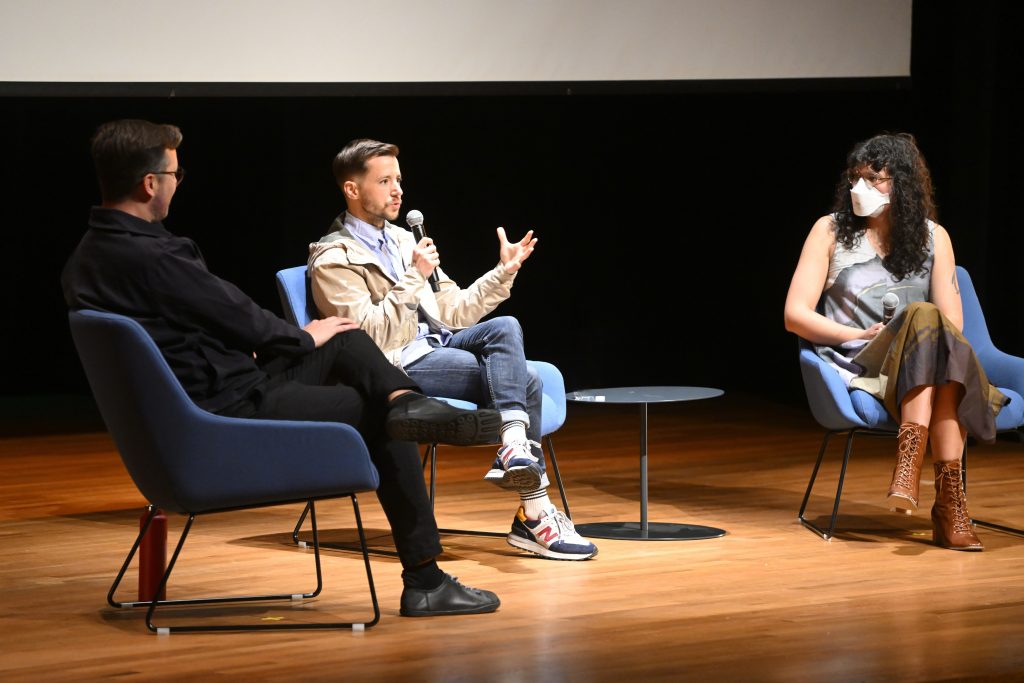
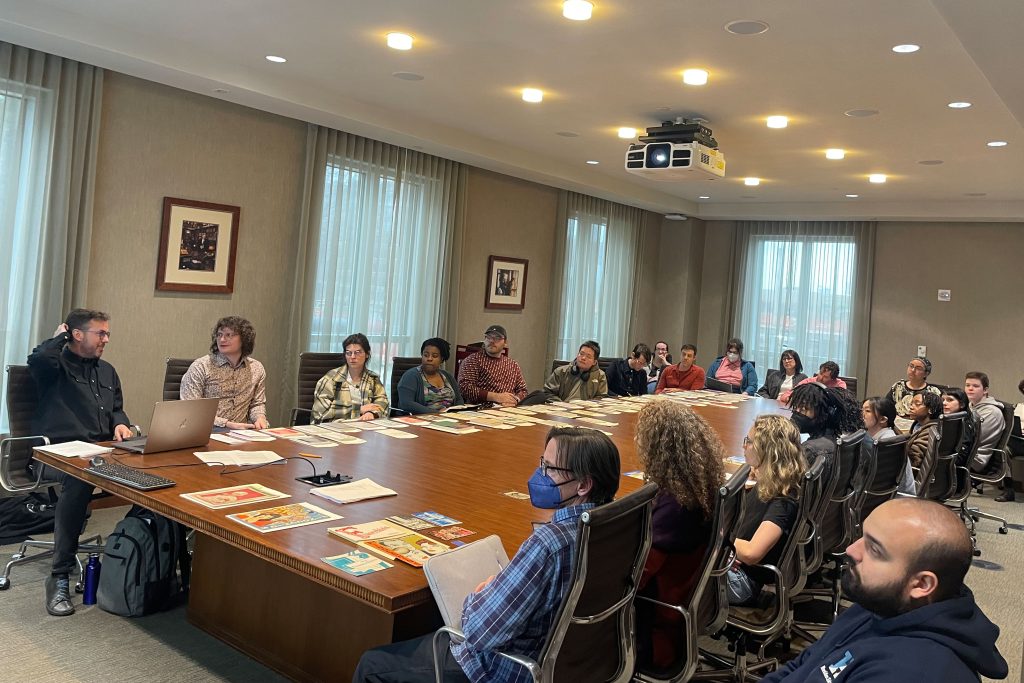
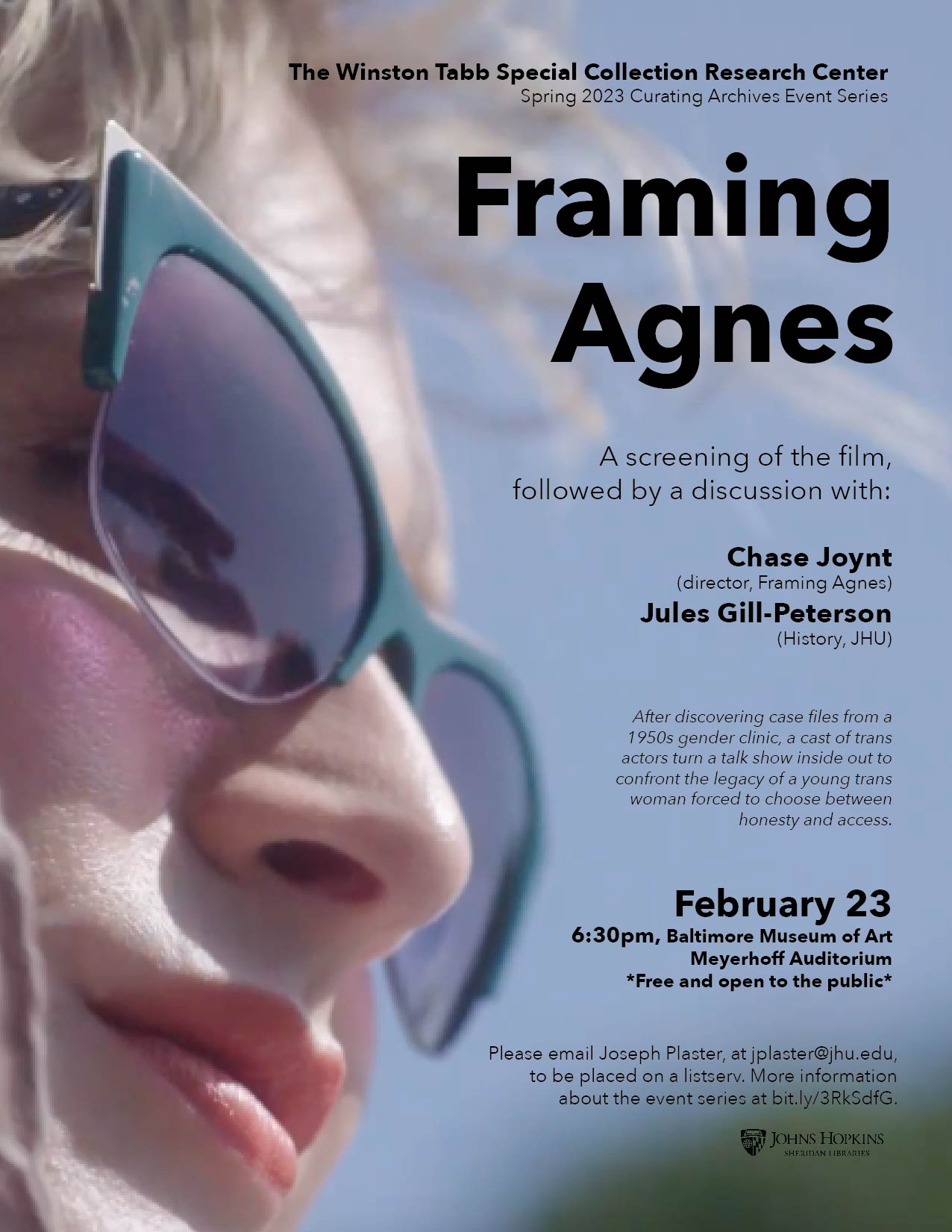
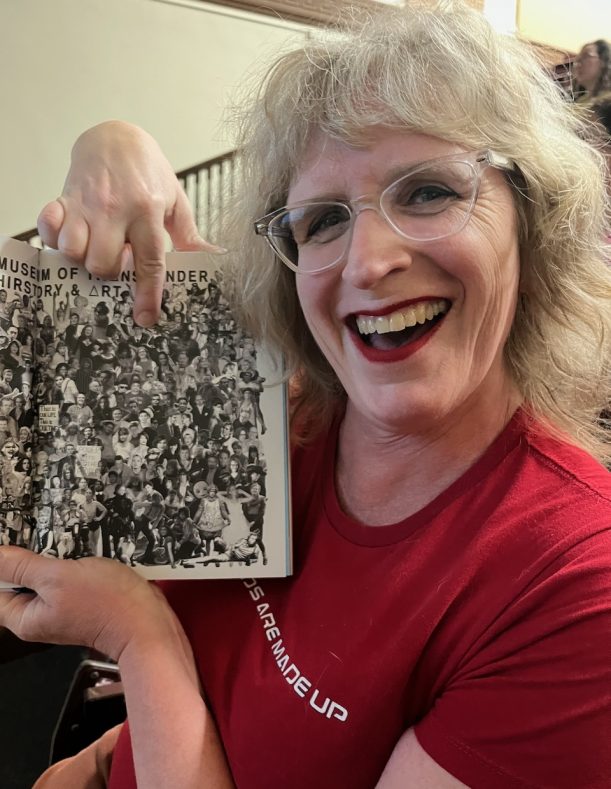
Undergraduate Courses
The Lab sponsors undergraduate courses that cross-pollinate with our speaker series, feature community-based guest lecturers, and public listening parties.
A Century of Trans Cultural Production
Jo Giardini, Spring 2024
Program in Program for the Study of Women, Gender, and Sexuality at the Krieger School of Arts and Sciences
This discussion oriented seminar offered an intensive survey of cultural production by trans, non-binary, gender-nonconforming, and intersex artists, writers, poets, and musicians. The course cross-pollinated with Giardini’s Trans Cultural Production speaker series.
Public Humanities & Social Justice
Joseph Plaster, Fall 2023
Program in Museums and Society at the Krieger School of Arts and Sciences
Explored collaborative humanities methods that foster democratic participation , including participatory action research, collaborative oral history, and participatory archival practices. Vintage T researchers presented their oral histories; students discussed transcripts based on readings.
Queer Oral History
Joseph Plaster, Spring 2022
Program in Museums and Society at the Krieger School of Arts and Sciences
Students learned to conduct, analyze, and interpret their own oral histories as they contributed to a project documenting queer worldmaking in the Baltimore-Washington D.C. region.
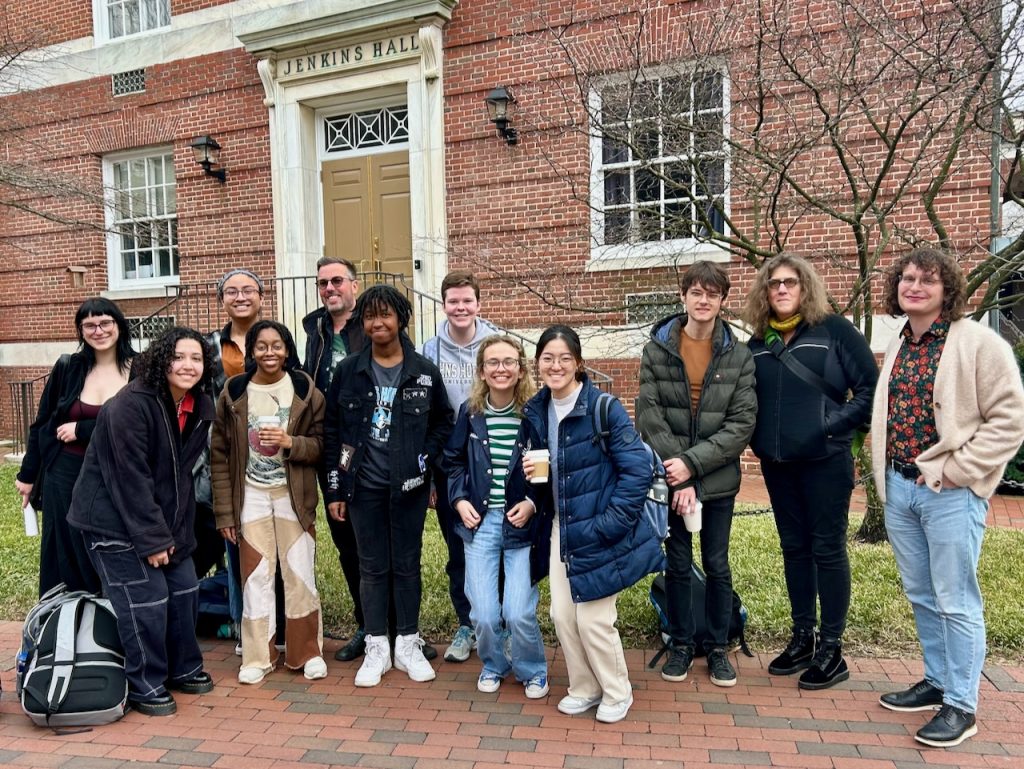
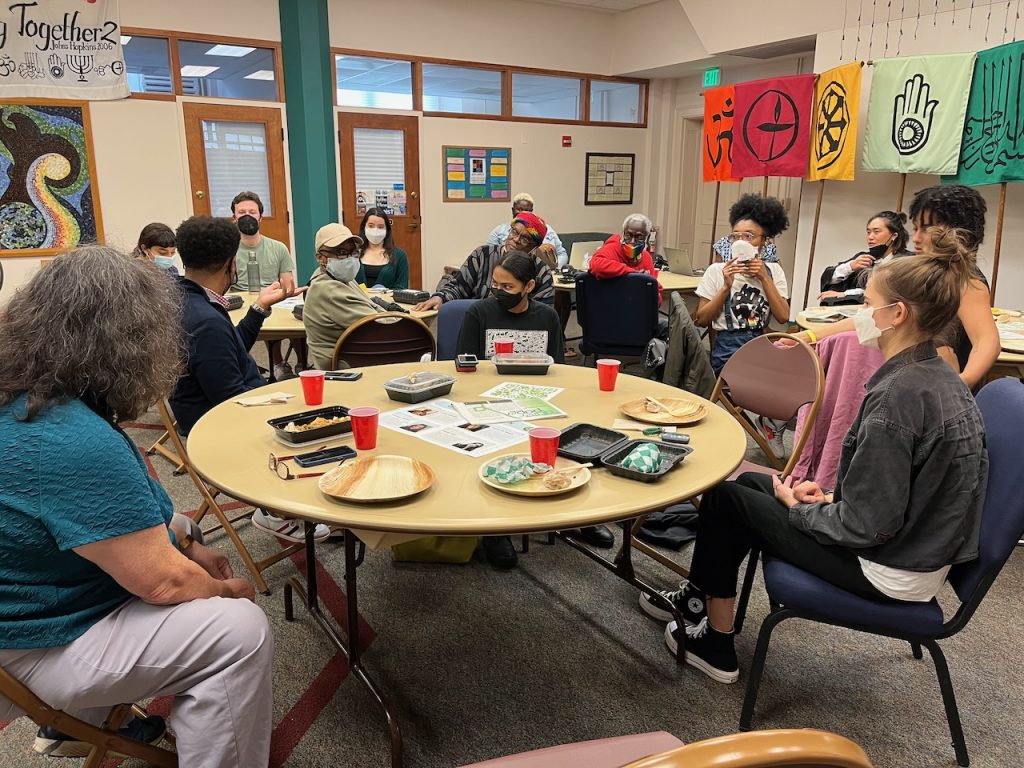
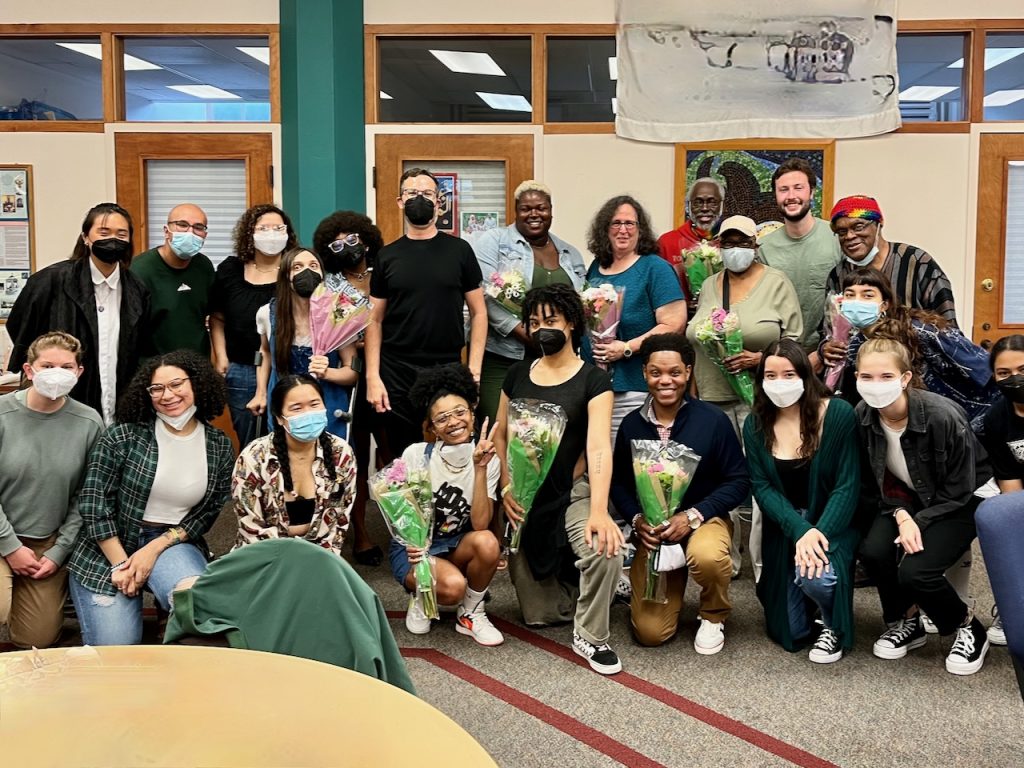
Archiving Trans Oral Histories

Vintage T Oral Histories
The first eleven oral histories, conducted by Vintage T, touch on subjects including punk music, the Baltimore Trans Alliance, standup comedy, and trans of color activism:
-
Erricka Bridgeford interviewed by Jamie Grace AlexanderClose
Erricka Bridgeford interviewed by Jamie Grace Alexander
Bridgeford talks about challenging societal norms and embracing their authentic gender expression while navigating leadership roles with courage and authenticity, advocating for grassroots activism against gentrification, and envisioning a future where communities are empowered to realize their potential while promoting peace of mind and individual well-being.
-
Roxanne Raven Storm interviewed by Jamie Grace AlexanderClose
Roxanne Raven Storm interviewed by Jamie Grace Alexander
In an interview with Jamie Grace Alexander, Roxanne Raven Storm, also known as Roxie, discusses her multifaceted identity as an artist, musician, writer, radical activist, and witch, reflecting on her role models like Sylvia Rivera and Marsha P. Johnson, her experiences in Baltimore’s LGBTQ+ spaces, and her music that blends doom metal, punk, and goth with political and personal themes.
-
Tyler Vile interviewed by Rahne AlexanderClose
Tyler Vile interviewed by Rahne Alexander
Tyler Vile, a trans activist and founding member of the Hinenu synagogue in Baltimore, discusses the intersections of their queer, Jewish, and disabled identities, the inclusive community dynamics of Hinenu, their personal gender identity journey, and their advocacy for accessibility, emphasizing the empowerment of marginalized groups and the impact of collective action.
-
Mickey Dehn interviewed by Rahne AlexanderClose
Mickey Dehn interviewed by Rahne Alexander
Mickey Dehn, a professor of biology and trans man, shares his evolving identity journey from lesbian to queer to gay, his FTM transition and involvement in Baltimore’s drag king scene, the challenges of medical transition, and his deep engagement with the local artistic community through organizing events like Small Foods.
-
Shawna Alexander interviewed by Jamie Grace AlexanderClose
Shawna Alexander interviewed by Jamie Grace Alexander
Shawna Alexander details her experiences in the entertainment industry, her journey as a trans woman, insights into her personality, and her advice for younger individuals. Shawna also shares insights into her personality, discussing how performing helps her escape from herself and expressing her desire for younger people to connect with older individuals to learn from their experiences. The interview captures Shawna’s humor, resilience, and passion for her craft.
-
Vann Michael Millhouse interviewed by Jamie Grace AlexanderClose
Vann Michael Millhouse interviewed by Jamie Grace Alexander
In an interview with Jamie Grace Alexander, Vann Michael Millhouse reflects on his transgender identity, emphasizing the importance of understanding one’s social background, navigating healthcare challenges, advocating for visibility and representation, and finding acceptance and guidance within LGBTQ+ spaces in Baltimore.
-
Rose Buttress interviewed by Rahne AlexanderClose
Rose Buttress interviewed by Rahne Alexander
Rose Buttress discusses her advocacy work, transition experiences, and aspirations for a trans lingerie project, while reflecting on the challenges of finding language for trans experiences, the importance of community and mentorship, and her vision for a future where trans individuals improve their quality of life through practical skills and institutions.
-
Teresa Palmoar interviewed by Rahne AlexanderClose
Teresa Palmoar interviewed by Rahne Alexander
In a conversation with Rahne Alexander, Teresa Palomar recounts her life experiences including a teaching career spanning 35 years in Baltimore, her social transition in the 1980s, her involvement in the trans communities of Baltimore and New Mexico, and reflections on societal shifts towards transgender acceptance.
-
Ian Gilmore interviewed by Rahne AlexanderClose
Ian Gilmore interviewed by Rahne Alexander
Ian Gilmore discusses his 20-year transition journey with Rahne Alexander, reflecting on his move from Georgia to Baltimore for its vibrant LGBTQ+ community, founding the Baltimore Transmasculine Alliance, the impact of gentrification on local LGBTQ+ spaces, his medical and personal transition milestones, and the evolving understanding of gender identity.
-
Rahne Alexander interviewed by Jamie Grace AlexanderClose
Rahne Alexander interviewed by Jamie Grace Alexander
Jamie Grace Alexander and Rahne Alexander delve into feminist activism while reflecting on Rahne’s transition journey, her curatorial work, and her band, the Degenerettes. Their conversation underscores the importance of inclusivity within feminist spaces and Rahne’s role in shaping Baltimore’s music scene.
-
Monica Yorkman interviewed by Jamie Grace AlexanderClose
Monica Yorkman interviewed by Jamie Grace Alexander
Monica Yorkman, a great-grandmother and activist, discusses her journey of self-discovery, resilience, and advocacy, emphasizing the importance of family support, her leadership in founding organizations like Sistas of the “T” and Baltimore Trans Alliance, and her commitment to educating her community and fostering their achievements.
Undergraduate Oral Histories
Hopkins students enrolled in Queer Oral History (Spring 2022) recorded and archived the following oral histories in JScholarship, Johns Hopkins University’s institutional repository
-
Oral History of Ken JiretsuClose
Oral History of Ken Jiretsu
Ken Jiretsu explains how he found out about Hearts and Ears, an LGBTQIA+ wellness and recovery center, and how he first came to them as a member of their peer support group while he was transitioning and then started volunteering and working with them and other LGBTQIA+ community organizations.
-
Oral History of Brother Merrick MosesClose
Oral History of Brother Merrick Moses
Brother Merrick Moses talks about growing up in New York City and the confluence of factors that caused him to go to college at Morgan State University in Baltimore, where he has now established his life and career. He reflects on his personal journeys with Buddhism and Catholicism, and on the intersections of Blackness, religion and spirituality, and LGBTQIA+ identities.
-
Oral History of Lisa JonesClose
Oral History of Lisa Jones
Lisa Jones, aka Freedom Jones, is a queer, black, and nonbinary activist, artist, and community leader living in the Baltimore area. In this interview, Freedom talks about their introduction to reform and activism, their name change, their rejection of the gender binary, the concept of “transformation,” their queerness, and their understanding of the politics of love. They also discuss their participation in Baltimore’s violence prevention initiatives.
-
Oral History of Paula NeiraClose
Oral History of Paula Neira
Dr. Neira discusses her experience in the navy and her work as a nurse and lawyer. After graduating with distinction from the United States Naval Academy in 1985, Paula was a regular and reserve surface warfare officer. In November 2016, she was named as the interim clinical program director of the Johns Hopkins Center for Transgender Health. Paula discusses her relationship with her family and her experiences growing up in New Jersey, her gender transition, and her experience coming out as a transgender woman to her mother.
-
Oral History of Taylor Cormon FosterClose
Oral History of Taylor Cormon Foster
Taylor Cormon Foster, a black, genderqueer and non-binary Baltimore native. shares stories about meaningful relationships, spaces, and organizations in Baltimore that have empowered them to live authentically. They discuss how drag has become a central aspect of their life. Taylor also discusses their activism via social media platforms.
-
Oral History of Bryanna JenkinsClose
Oral History of Bryanna Jenkins
Jenkins discusses her rich experience as an activist and a lawyer working for trans rights in Baltimore. She centers her story around the 2015 Baltimore Uprising, discussing the uprising itself and its impact on black queer and trans communities in Baltimore. She ends on a note of hope for a joyful and just future.
-
Oral History of Tyler VileClose
Oral History of Tyler Vile
Vile shares her personal history living in Baltimore and how it awakened her sense of social and political justice. She talks about how she experienced the 2015 Baltimore Uprising and describes her work with the Baltimore Transgender Alliance, which was formed in the aftermath of the Uprising, and explains how her trans, Jewish, and disabled identities have shaped her activism.
-
Oral History of Keyanna Monae Devoreaux-VorheesClose
Oral History of Keyanna Monae Devoreaux-Vorhees
Keyanna speaks about her experiences with foster care, sex work, and the ballroom scene. She talks about the intergenerational ties and support networks in LGBTQ and trans communities, and the ways they have shaped her life. She discusses her experiences being diagnosed with HIV as a teenager, moving to the Baltimore, her current activism, and her hopes for the future.
-
Oral History of Jamie Grace AlexanderClose
Oral History of Jamie Grace Alexander
Jamie Grace Alexander shares her thoughts about queer culture, liminal spaces, and a “soft power” that is specifically femme. She talks about how she identifies with queerness and transness in the context of Baltimore and how queerness grows horizontally as a culture.
